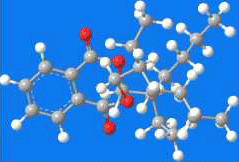

Bis(2-ethylhexyl) phthalate, known by a variety of other names and usually abbreviated DEHP, was patented in 1950 and first used as vacuum pump oil. But since then, it has become the most widely used plasticizer for poly(vinyl chloride) (PVC) and other plastics. Recently, relatively high levels of DEHP have been found in foods, especially foods high in oils and fats. The U.S. Food and Drug Administration now restricts its use in packaging materials to water-based foods. The European Commission has banned the use of DEHP and other phthalates in PVC toys.
MOTW Update:
February 13, 2017
Bis(2-ethylhexyl) phthalate, di-n-butyl phthalate, methylparaben, and hexabromocyclododecane are all former Molecules of the Week. Last month, Janet Pelley wrote in ACS Central Science that these and many other commercial products are principal components of common household dust. (A similar article appears in this week’s C&EN.) The alarming aspect of these findings is that all of these compounds are toxic, primarily to the human reproductive, hormonal, and nervous systems.

Learn more about this molecule from CAS, the most authoritative and comprehensive source for chemical information.
Molecule of the Week needs your suggestions!
If your favorite molecule is not in our archive, please send us a message. The molecule can be notable for its current or historical importance or for any quirky reason. Thank you!
Stay Ahead of the Chemistry Curve
Learn how ACS can help you stay ahead in the world of chemistry.

